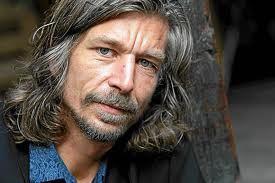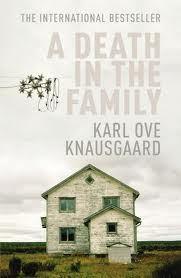Saturday was a day of filthy weather here, and by the time I had battled my way through the endless rain from sepia skies and the Christmas traffic to the town center and fought through the churning crowds at the literary Wordfest – streams of people dithering in front of you, stopping abruptly, meandering across the whole of the passageway – to get to the library in the Union, I was more than ready to hear a melancholy Norwegian giant reading from the first of his six-volume novel/memoir entitled with a nod to Hitler, My Struggle. Struggle was clearly the word for the day. Karl Ove Knausgaard is one of those interestingly wrecked people, a war weary Viking of a man in crumpled jeans and leather jacket, with artistically long hair that he ran his hands through, sighing. If you were a woman with a rescue complex, this is the sort of man you might love to distraction, although he may be, I hazard a guess, a nightmare to live with. Talk about courage, though, as he conducted the interview and reading in an English that was charmingly broken although not in a way that marred the sense. I could so imagine attempting something similar in French and leaving an audience perplexed and confused.
A Death in the Family is the first volume translated into English of his huge work. It was a succès de scandale in his native country because of the coruscating honesty of his writing, in a tale that deals with his troubled relationship to an overbearing and ultimately alcoholic father. Below are edited highlights of his talk:

I was a father, three kids, in my 40s and it was a real mid-life crisis, you know? What could I do? I could have shot myself, left the family, or written the book. I felt my life had no meaning, no joy, and I wanted to understand why when I had my children and my wife, I was a writer. I wanted to live a life full of meaning and so that had to be through art, where meaning is compressed.
I had a hard father, authoritarian, he dominated my life, I was afraid of him, I always knew what was on his mind, where he was. I hated him, wanted him dead. Then when he was dead I experienced such deep sorrow. After his death everything changed, everything was intense and I wanted to make that feeling into a novel, even if it meant scaring the reader off.
I knew I wanted to write the story of my father and I tried four years writing it as fiction, but the story, I couldn’t believe in it. But I had to continue. By accident I started writing about myself, I began revealing the most shameful incidents of my life. And there was genuine energy there. This was something I could write. I was writing about the banality of being 16, going to a party with a friend and we were denied entrance, we go home, nothing happened. Yes, nothing happened. But I had written one hundred pages in telling this. And I thought if I have written one hundred pages about nothing then I can write about death, about nothingness, about meaningless.
I wrote everything blindly, hoping it would make sense. It was terrible writing about myself. Such self-loathing. No I don’t revise or edit my books. Four years without results and then after that it was easy. The job is done before the writing. I knew the final sentence: ‘I’m so happy I am no longer an author.’ I was turning away from life into literature and I kept doing it when I grew up. I didn’t want to confront life, I wanted to turn away from it. My wife and children they are different, they want to drag me back in. So I have to learn to live, by writing. This is an existential search into a life, I know that sounds pompous, but that’s what it is. I couldn’t write an autobiography, I couldn’t do it.
I don’t write for anyone. If you do that, you’re dead as a writer.
The hardest thing to do was to write below my standard of writing. My whole life I wanted to please, to make people love me, not to tell people what I really think, I was afraid of conflict. If you do that in writing, you want to show everyone how clever you are. I wanted to avoid that, be as honest as possible, and as brutal as possible. It is for me, I never thought anyone would be interested in it, it’s boring, everything detailed to the absurd. It’s not an interesting life, nothing interesting ever happened to me. So what happened with the book was a total shock for me. Now everyone knows all about me,
I was very naïve. I didn’t tell anyone about what I was doing, I was just free. I sent the manuscript to everyone I wrote about. Then all hell broke loose, my family threatened to stop the book. I changed all the names of everyone in the family. The problem is we are the only family in Norway with my name, it’s an unusual name! But it’s very sensitive, no family wants these things published [about his father’s alcoholism]. Then I thought, who can stop me from writing about my own father? So I can publish this.
I am very glad that I did it because it was so difficult. It couldn’t have been done under any other circumstances. If I started to write it now, it would be totally different. I am glad I captured that feeling in these books. But I am ashamed of them. So it is very strange, when I get praise for these books.
It is better to live now, but not because of these books. I didn’t learn anything from them. You write because you are broken. Writing is healing because the process is healing. But once you stop writing, you are broken again.

I now have my signed copy of A Death in the Family (I was my usual hopeless self in the face of an author I admired, gabbling away about nothing at all), and am most curious about it. Expect a review in due course….
